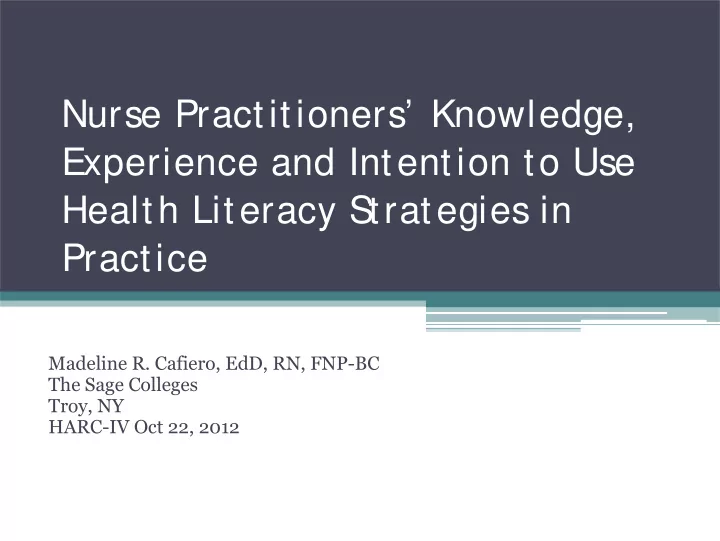

Nurse Practitioners’ Knowledge, Experience and Intention to Use Health Literacy S trategies in Practice Madeline R. Cafiero, EdD, RN, FNP-BC The Sage Colleges Troy, NY HARC-IV Oct 22, 2012
Background and Theoretical Framework • Paucity of research exploring nurse practitioner providers and their health literacy knowledge • Less known about NPs’ experience with health literacy strategies in practice • Future use of health literacy strategies with patients was explored using Theory of Planned Behavior as a framework (Fishbein & Ajzen, 1975, 2010)
Research Questions • What do nurse practitioners (NPs) know about health literacy (HL) and related strategies for clinical practice? • What health literacy strategies are currently used by NPs in clinical practice? • What is the intention of NPs to use health literacy strategies in future clinical practice?
S tudy Methodology/ Instruments • Descriptive, correlational, quantitative • Knowledge measured with Health Literacy Knowledge and Experience Survey (HLKES), Part I (Cormier, 2006) • Experience measured with Health Literacy Knowledge and Experience Survey (HLKES), Part II, Experience Scale (Cormier, 2006) • Intention measured with Health Literacy Strategies Behavioral Intention (HLSBI) Questionnaire (Cafiero, 2012)
S tudy Findings • Demographics: ▫ 456 nurse practitioners (NPs) 73% return rate ▫ Sample compared with national profile: � Increased number certified � Increased number with doctoral preparation � More working in primary care • Knowledge: Poor ▫ Overall mean score: 69/100 ▫ Gaps noted in regard to: HL effect on healthcare status, screening tools for low health literacy and evaluation measures of education materials
S tudy findings (continued) • Experience: Some ▫ 75% of participants reported “never” or only “sometimes” having HL emphasized in NP curriculum ▫ Culturally appropriate w ritten m aterials were most frequently used for patient education ▫ 66% of NPs reported “never” or “sometimes” evaluating reading level of written materials ▫ Audiotapes, videotapes and computer software were used least often • Intention: Strong ▫ Mean score for each item 5.44 out of 7 Likert scale ▫ Higher the score, the greater the likelihood participants intend to use health literacy strategies
S tudy Findings (continued) • Significant relationship between Experience and Educational Preparation � Doctorally prepared NPs had higher mean scores on experience than post-master’s prepared NPs ( p = 0.039) Practice setting � Specialty practice NPs had higher mean scores on experience than episodic urgent care NPs ( p = 0.008)
Instrument Reliability Reliabilty of Cormier (2006) with Cafiero (2012) with instruments RNs (Cronbach’s α ) NPs (Cronbach’s α ) HLKES Part I None reported .57 Knowledge HLKES Part II .82 .69 Experience HLSBI NA .76 Intention
Study Implications Knowledge: ▫ Increase NPs’ knowledge of health literacy (HL) Experience: � Improve NP evaluation of written patient education materials for use with low HL patients � Develop HL appropriate patient education materials in other formats Intention: ▫ Support intention of NPs to use of health literacy strategies
Future Research • Knowledge: ▫ How best to provide NPs with educational opportunities related to health literacy and health literacy strategies • Experience: ▫ The relationship between practice settings and use of health literacy strategies • Intention: ▫ How best to support intention to use HL strategies ▫ Further testing of HLSBI instrument
References Cafiero, M.R. (2012). Nurse practitioners’ know ledge, experience and intention to use health literacy strategies in practice . (Doctoral dissertation). Retrieved from Proquest Dissertations and Theses. (3508251) Cormier, C. M. (2006). Health literacy: The know ledge and experiences of senior baccalaureate nursing students (Doctoral dissertation). Retrieved from Proquest Dissertations and Theses. (3244945) Cormier, C. M., & Kotrlik, J. W. (2009). Health literacy knowledge and experiences of senior baccalaureate nursing students. Journal of Nursing Education, 48, 237-249. doi: 10.9999/01484834-20090416- 02 Fishbein, M., & Ajzen, I. (1975). Belief, attitude, intention, and behavior: An introduction to theory and research. Reading, MA: Addison- Wesley. Fishbein, M., & Ajzen, I. (2010). Predicting and changing behavior: The reasoned action approach . New York: Psychology Press.
Recommend
More recommend